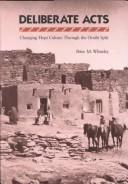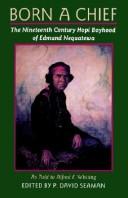| Listing 1 - 7 of 7 |
Sort by
|

ISBN: 0816510377 0816537879 Year: 1988 Publisher: Tucson : University of Arizona Press,
Abstract | Keywords | Export | Availability | Bookmark
 Loading...
Loading...Choose an application
- Reference Manager
- EndNote
- RefWorks (Direct export to RefWorks)
Hopi Indians --- History. --- Politics and government. --- Religion. --- Moki Indians --- Moqui Indians --- Tusayan Indians --- Indians of North America --- Shoshonean Indians

ISBN: 0816540748 0816513279 Year: 2019 Publisher: University of Arizona Press
Abstract | Keywords | Export | Availability | Bookmark
 Loading...
Loading...Choose an application
- Reference Manager
- EndNote
- RefWorks (Direct export to RefWorks)
An account of the first twenty-two years of the life of Edmund Nequatewa on the Hopi reservation in northern Arizona.
Hopi Indians --- Hopi Indians. --- Hopi (Indiens) --- Social life and customs. --- Biographies. --- Nequatewa, Edmund, --- Childhood and youth. --- Moki Indians --- Moqui Indians --- Tusayan Indians --- Indians of North America --- Shoshonean Indians
Book
ISBN: 0300198892 9780300198898 9780300191035 0300191030 Year: 2013 Publisher: New Haven, Connecticut
Abstract | Keywords | Export | Availability | Bookmark
 Loading...
Loading...Choose an application
- Reference Manager
- EndNote
- RefWorks (Direct export to RefWorks)
First published in 1942, Sun Chief is the autobiography of Hopi Chief Don C. Talayesva and offers a unique insider view on Hopi society. In a new Foreword, Matthew Sakiestewa Gilbert situates the book within contemporary Hopi studies, exploring how scholars have used the book since its publication more than seventy years ago.
Hopi Indians --- Moki Indians --- Moqui Indians --- Tusayan Indians --- Indians of North America --- Shoshonean Indians --- Social life and customs. --- Talayesva, Don C.,
Book
ISBN: 0803268483 9780803268487 9780803262881 0803262884 Year: 2015 Publisher: Lincoln
Abstract | Keywords | Export | Availability | Bookmark
 Loading...
Loading...Choose an application
- Reference Manager
- EndNote
- RefWorks (Direct export to RefWorks)
Hopi Indians --- Kachinas. --- Songs, Hopi --- Moki Indians --- Moqui Indians --- Tusayan Indians --- Indians of North America --- Shoshonean Indians --- Hopi songs --- Katchinas --- Katcinas --- Katsinas --- Pueblo Indians --- Zuni Indians --- Social life and customs. --- Music --- History and criticism. --- Religion
Book
ISBN: 1607813548 9781607813545 9781607813538 160781353X Year: 2015 Publisher: Salt Lake City
Abstract | Keywords | Export | Availability | Bookmark
 Loading...
Loading...Choose an application
- Reference Manager
- EndNote
- RefWorks (Direct export to RefWorks)
Reproduces the dictionary compiled by two Mormon missionaries to the Hopi and written in a non-Roman phonemic alphabet that Brigham Young was promoting. Also includes a discussion of the provenance and background of the book, the Hopi language, and the Mormon mission; identifies Hopi words in modern dictionaries; and transcribes words from the Deseret Alphabet into the International Phonetic Alphabet.
Mormon Church --- Hopi language. --- Hopi Indians --- English language. --- Deseret alphabet. --- English language --- Moki Indians --- Moqui Indians --- Tusayan Indians --- Indians of North America --- Shoshonean Indians --- Spelling reform --- Hopitu language --- Moki language --- Shinumo language --- Shoshonean languages --- Germanic languages --- Missions. --- Hopi. --- Alphabet --- Mormonism --- Christian sects --- Latter Day Saint churches
Book
ISBN: 1438480083 9781438480084 1438480067 1438480075 Year: 2020 Publisher: Albany : State University of New York Press,
Abstract | Keywords | Export | Availability | Bookmark
 Loading...
Loading...Choose an application
- Reference Manager
- EndNote
- RefWorks (Direct export to RefWorks)
After a theoretical and historical introduction to American Indian boarding-school literature, Changed Forever, Volume II examines the autobiographical writings of a number of Native Americans who attended the federal Indian boarding schools. Considering a wide range of tribal writers, some of them well known—like Charles Eastman, Luther Standing Bear, and Zitkala-Sa—but most of them little known—like Walter Littlemoon, Adam Fortunate Eagle, Reuben Snake, and Edna Manitowabi, among others—the book offers the first wide-ranging assessment of their texts and their thoughts about their experiences at the schools.
Off-reservation boarding schools --- Boarding school students --- Students --- Indian residential schools --- Non-reservation boarding schools --- Non-reservation schools --- Off-reservation Indian boarding schools --- Off-reservation Indian schools --- Off-the-reservation boarding schools --- Residential schools, Indian --- Boarding schools --- Indians of North America --- Education --- Indian students --- Hopi Indians --- Navajo Indians --- Apache Indians --- Autobiography --- Indian authors. --- Autobiographies --- Autobiography of Indian authors --- Indian autobiography --- Moki Indians --- Moqui Indians --- Tusayan Indians --- Shoshonean Indians --- Students, Indian --- Indian authors
Book
ISBN: 0226712966 1281966312 9786611966317 9780226712963 9780226712932 0226712931 9780226712956 0226712958 0226712931 9780226712932 Year: 2008 Publisher: Chicago University of Chicago Press
Abstract | Keywords | Export | Availability | Bookmark
 Loading...
Loading...Choose an application
- Reference Manager
- EndNote
- RefWorks (Direct export to RefWorks)
Arguing with Tradition is the first book to explore language and interaction within a contemporary Native American legal system. Grounded in Justin Richland's extensive field research on the Hopi Indian Nation of northeastern Arizona-on whose appellate court he now serves as Justice Pro Tempore-this innovative work explains how Hopi notions of tradition and culture shape and are shaped by the processes of Hopi jurisprudence. Like many indigenous legal institutions across North America, the Hopi Tribal Court was created in the image of Anglo-American-style law. But Richland shows that in recent years, Hopi jurists and litigants have called for their courts to develop a jurisprudence that better reflects Hopi culture and traditions. Providing unprecedented insights into the Hopi and English courtroom interactions through which this conflict plays out, Richland argues that tensions between the language of Anglo-style law and Hopi tradition both drive Hopi jurisprudence and make it unique. Ultimately, Richland's analyses of the language of Hopi law offer a fresh approach to the cultural politics that influence indigenous legal and governmental practices worldwide.
Hopi Indians --- Hopi law --- Indian courts --- Indians of North America --- Law, Hopi --- Customary law --- Moki Indians --- Moqui Indians --- Tusayan Indians --- Shoshonean Indians --- Legal status, laws, etc. --- Hopi Tribe of Arizona. --- Hopi Tribe --- Law --- Legal status, laws, etc --- Hopi Indian Tribe --- Hopi Tribe, Arizona --- Hopi Indians - Legal status, laws, etc --- Hopi law - Arizona --- Law - Hopi Tribe of Arizona --- Indian courts - United States --- Indians of North America - Arizona --- traditional, language, linguistics, law, legal, litigation, hopi, tribe, tribal, court, courtroom, anthropology, anthropological, anthropologist, culture, cultural, history, historical, academic, scholarly, research, contemporary, native american, america, usa, united states, indigenous, justice, fieldwork, anglo, government, arizona, sovereignty, ethnography, ethnographic.
| Listing 1 - 7 of 7 |
Sort by
|

 Search
Search Feedback
Feedback About UniCat
About UniCat  Help
Help News
News